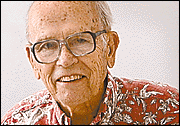Advertisement - Click to support our sponsors.


Hawaii’s World
COULD Sun Yat-sen, revered by both the People's Republic of China and the Nationalist government on Taiwan, be a son of Hawaii? Sun Yat-sen’s strong
links to HawaiiThere's a birth certificate that says so, but even Sun renounced it in due course. It did, however, help him circumvent the Chinese Exclusion Act of 1882, which became applicable when Hawaii was annexed to the United States in 1898.
The certificate, issued by the Territory of Hawaii in March 1904, declared he had been born in Kula, Maui, where his relatives lived. As a "citizen of Hawaii" he could travel to the U.S. mainland in the early 1900s to rally both support and funds for his revolutionary efforts. Some Chinese friends attested to the birth.
His Punahou teacher, Francis Damon, certified to his good character but did not swear on the issue of birth. Damon is the grandfather of attorney Frank Damon, a major present-day supporter of Punahou.
Sun spent only a semester at Punahou in 1883. He spoke no word of English when he arrived in Hawaii in 1879 at age 13, but four years later received an English grammar prize at Iolani School, personally presented by King Kalakaua.
Sun was a notable first among Asian revolutionaries who used Hawaii to gather strength for their challenges to tyranny back home. Korea's Syngman Rhee was one, too.
THE Sun story will be offered as a short slide show next Monday at the opening sessions here of the Pacific Basin Economic Council, which is attracting top business and political leaders from 20 Asia-Pacific economies including China and Taiwan. The U.S. ambassador to China and China's ambassador to the United States will speak jointly that day.
The Sun story is based on the book, "Sun Yat-sen in Hawaii," published last year by the Hawaii Chinese History Center and the Dr. Sun Yat-sen Hawaii Foundation. The authors are Yansheng Ma Lum and Raymond Mun Kong Lum.
They detail Sun's six visits to Hawaii -- 1879-83, 1884-85, 1894-95, 1896, 1903-04 and 1910. Sun was born in 1866 in Zhong Shan, China. He died in China in 1923.
The authors say in Sun's studies at Iolani and Punahou "he was exposed to Western culture, was strongly influenced by it, and in his young mind the seeds of Western democracy were planted.
Sun himself said in 1910: "It was here (Hawaii) that I came to understand what modern civilized governments are like and what they mean." He formed his first revolutionary party in Honolulu in 1894.
A coordinator of the book and author of a foreword is Leigh-wai Doo, a former member of the Honolulu City Council. He was a Punahou student of more recent vintage. Doo quotes the director of the Sun Yat-sen Institute of Guangzho, China, as saying, "Without his experience in Hawaii there would not be the great career of Dr. Sun Yat-sen."
Doo's relative, Young Sen-yat, was called by Sun "the father of China's air force." Young was Hawaii's first island-born land and seaplane pilot with U.S. pilot's license Serial No. 416. He went to China in 1918, then traveled to Japan, the U.S. mainland and Mexico to raise funds for 12 planes to support Sun. In 1923 he was killed in combat.
America's first U.S. senator of Chinese ancestry, Hiram L. Fong, now 93 and retired, traveled to both Beijing and Taipei while in office and did much to permit increased immigration to the United States from Asian countries, including China.
A.A. Smyser is the contributing editor
and former editor of the the Star-Bulletin
His column runs Tuesday and Thursday.